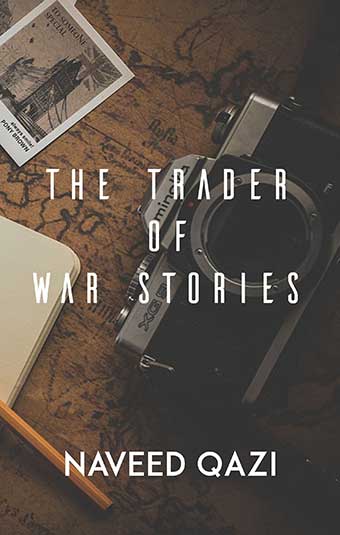Publisher: CreateSpace Independent Publishing Platform
Pages: 402
Genre: Political Thriller
A new band of writers has emerged from the valley, in recent times. Young Kashmiris have been writing evocative poetry and fiction. It proves that there is ample talent in the youth who don’t fear to experiment with their time by pursuing their passions.
The political turmoil, reflection of cultural history, its realisation and the changing landscape of common Kashmiri life has made many individuals to dwell into the pertaining realities around.
 The prose of his 23-chapter novel ‘The Trader of War Stories’ is lyrical to its core, devastatingly life like, filled with nostalgia, pain of cultural longings and fractured family and work relationships.
The prose of his 23-chapter novel ‘The Trader of War Stories’ is lyrical to its core, devastatingly life like, filled with nostalgia, pain of cultural longings and fractured family and work relationships.
Presumably, ‘The Trader of War Stories’ fits the genre of ‘Fictitious Memoirs’ – a Nabakov’s term, where authors use it as a literary device to drift away into more novelistic forms.
It’s interesting that young and ambitious Kashmiri writers such as Naveed continue to hold faith in this tradition. It seems an impressive debut, even if the plot appears throwback. Perhaps, it is tailored for the readers of this generation.
In literature, historically, we have seen this emerging trend in Ernest Hemingway’s novels, in the critically acclaimed ‘Memoirs of a Geisha’ by Arthur Golden and in ‘Orlando’ by Virginia Wolf.
The author has mixed travelogue elements, questions of human morality, war life, cultural disparities of nations, un-freedom in certain unique ways.
The plot of the novel is linear, in terms of a tough life endured by a war correspondent, until the main protagonist, Matteo Costello, is transferred back to London on an official transfer order.
The novel claims to have a strong geopolitical theme, including around nine conflict zones, and is ostensibly centered around a character called Matteo Costello, an immigrant Italian in Britain who is tasked to perform his assignments by an editor of a London based media agency.
In the novel itself, the author has used the term ‘The Trader of War Stories’ for the main protagonist, perhaps because his community members and his family members think that he had sacrificed social concerns for the kind of job he did all along his life.
As a reader, one can find a great deal about common observations in city life, culture, politics and blighted human relationships in the Asian world.
In a chapter of his novel ‘Learning Years’, he wrote about common Afghan life:
“Veiled women were often found begging on the streets. Street hustlers made a living by pickpocketing. There was poverty around where some people could kill another for bread, there were orphanages that were abundant, where young boys and girls were sold off to their novice masters for imposed drudgery that would continue for a major part of their lives.”
One of the most interesting plot in the novel is when the main protagonist encounters a Kashmiri saffron grower in La Mancha, Castille in Spain and the fast paced plot, which then suddenly revolves around Kashmir. It is one of those fascinating stories of the plot.
In one of the striking passages in the plot, Naveed wrote: “People still were emotionally connected to the vale by seeing a value in their local cultural life. They were still seriously political and tried to find their identity by inheriting memories from the experiences of each other. For Kashmiris, the struggle to remember never ended.”
Infact, the novels cover almost all important events of history including the Bosnian War, Chechen War, Tamil war in Sri Lanka, Libyan and Syrian conflicts, post 9/11 years including the war life in Iraq and Afghanistan.
Perhaps, one side of a critical interpretation is that some readers might argue, that it would have been better to read a non fiction autobiography of some acclaimed journalists, but at the same time, the plot features numerous conflict zones.
The novel serves as a quick run down of these events, in a compelling way. Maybe, that is the strength of the plot.
The novel also raises some serious questions. In the world, certain people seek morality, but when the world largely reflects a deteriorating condition, contradictions, problems and paradoxes come. And human beings have to keep on striving by living in this apparent reality.
Saaeid Ibn Mukhtar is a Marketing Communications Professional with a Master’s Degree in International Business & Management from the University of Bedfordshire. He is the Co-Founder of the first of its kind Creative & Digital Marketing Agency of Kashmir Cut & Paste.










































